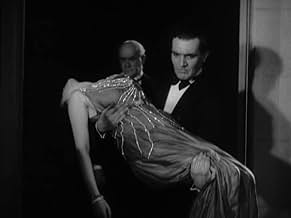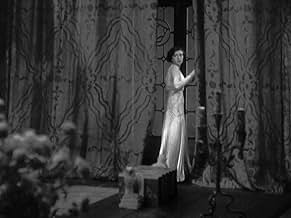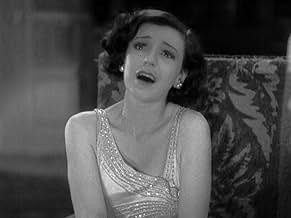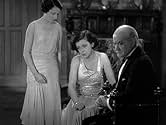NOTE IMDb
5,7/10
3,8 k
MA NOTE
Une famille traditionnelle et une famille moderne se disputent un terrain dans un petit village anglais.Une famille traditionnelle et une famille moderne se disputent un terrain dans un petit village anglais.Une famille traditionnelle et une famille moderne se disputent un terrain dans un petit village anglais.
- Réalisation
- Scénario
- Casting principal
Rodney Ackland
- Man at Auction
- (non crédité)
Ivor Barnard
- Man at Auction
- (non crédité)
Wally Patch
- Van Driver
- (non crédité)
Avis à la une
Technical crudities, print/sound deficiencies and dated acting styles taken into consideration, "Skin Game" still has innovative (for the time) camera techniques and thematic ambiguity (who is right and who is wrong? Who are the true villains of the story?) and is generally better than other, more "typical" Hitchcock films of the period, like "Murder!" from 1930.Edmund Gwenn is terrific and Phyllis Constam is quite sexy. (**1/2)
Fine and interesting story from the play of the same name adapted by Alfred Hitchcock himself and his wife and usual writer Alma Reville . Dealing with two British families : the aristocratic Hillcrist family, and Hornblower family headed by proud and ambitious Mr. Hornblower : Edmund Gwenn , both of them feud over land rights . As the latter , the mercilessly pushy Mister Hornblower sends away and evicts poor farmers to build factories on their lands . After that , Mr. Hornblower outwits Hillcrist in an auction for an additional piece of area property , the wealthy Hillcrists find their big estate completely surrounded by the upstart Hornblower . Things go wrong when Mrs. Hillcrest settles a terrible secret about a dark past of the Hornblower family .
It isn't thrilling , neither suspenseful , non characteristic of working with Hitchcock , but a tumultuous and strong drama . Way too much talking in excruciating , long and drawn-out scenes . This is a brooding drama whose premise turns out to be the hard confrontation between a rich family , the Hillcrests , fighting against the speculator who attempts to make a chimneyed factory complex , Hornblower , then emerges a dark secret resulting in tragic consequences , as it is used as a blackmail againts the speculator and force him to stop doing business . Performances are uniformly good , though in an excessive theatrical style . Based on a successfyl play and still stunningly hypnotic to see today . In fact , being , nowadays ,more stimulating for its innovations in that area , and by experimenting with a peculiar narrative structure . This fine early effort by Hitch has several novelties , as the movie transcends the limitation of its dramatic plot by dealing with thought-provoking issues and focusing on the theatrical meditations of reality . Here Alfred gives a few signs to be an expertise at tightening tension that was already building up . Main known actor results to be Edmund Gwen , giving a nice acting as the nouveau riche, social climber Mr. Hornblower who buys a lot of property abutting their state. Along with other notorious but unknown actors such as : Jill Esmond , Helen Haye , Phyllis Konstam, John Longden, Frank Lawton , C. V. France , Herbert Ross , among others .
This early talkie motion picture was well realized by the famous Alfred Hitchcock and made in his previous British period . His first sound film for Great Britain was ¨Blackmail¨, being made as a silent movie , this one was really an early talkie . This film ¨Skin Game¨1931 belongs to Hitch's first British epoch when he directed silent films, such as ¨The lodger¨ (1926) , ¨The ring¨(1927) , ¨Easy virtue¨ (1927) , ¨The Manxman¨(29) ; being ¨Blackmail¨(29) made as a silent , this was reworked to become a talkie . Following sound movies and early talkies as ¨Murder¨(1930 , ¨June and the Paycock¨(30) , ¨Rich and strange¨(32) , ¨Number 17¨(32) , ¨The man who knew too much¨(34) , ¨The 39 steps¨ (35) , ¨The secret agent¨(36) , ¨Sabotage¨(36) , ¨The lady vanishes¨(38) , ¨Jamaica Inn¨ (39) until he is hired by David O'Selznick to shoot¨Rebecca¨(40) in the US and continuing with other popular movies and masterpieces with world successes .
It isn't thrilling , neither suspenseful , non characteristic of working with Hitchcock , but a tumultuous and strong drama . Way too much talking in excruciating , long and drawn-out scenes . This is a brooding drama whose premise turns out to be the hard confrontation between a rich family , the Hillcrests , fighting against the speculator who attempts to make a chimneyed factory complex , Hornblower , then emerges a dark secret resulting in tragic consequences , as it is used as a blackmail againts the speculator and force him to stop doing business . Performances are uniformly good , though in an excessive theatrical style . Based on a successfyl play and still stunningly hypnotic to see today . In fact , being , nowadays ,more stimulating for its innovations in that area , and by experimenting with a peculiar narrative structure . This fine early effort by Hitch has several novelties , as the movie transcends the limitation of its dramatic plot by dealing with thought-provoking issues and focusing on the theatrical meditations of reality . Here Alfred gives a few signs to be an expertise at tightening tension that was already building up . Main known actor results to be Edmund Gwen , giving a nice acting as the nouveau riche, social climber Mr. Hornblower who buys a lot of property abutting their state. Along with other notorious but unknown actors such as : Jill Esmond , Helen Haye , Phyllis Konstam, John Longden, Frank Lawton , C. V. France , Herbert Ross , among others .
This early talkie motion picture was well realized by the famous Alfred Hitchcock and made in his previous British period . His first sound film for Great Britain was ¨Blackmail¨, being made as a silent movie , this one was really an early talkie . This film ¨Skin Game¨1931 belongs to Hitch's first British epoch when he directed silent films, such as ¨The lodger¨ (1926) , ¨The ring¨(1927) , ¨Easy virtue¨ (1927) , ¨The Manxman¨(29) ; being ¨Blackmail¨(29) made as a silent , this was reworked to become a talkie . Following sound movies and early talkies as ¨Murder¨(1930 , ¨June and the Paycock¨(30) , ¨Rich and strange¨(32) , ¨Number 17¨(32) , ¨The man who knew too much¨(34) , ¨The 39 steps¨ (35) , ¨The secret agent¨(36) , ¨Sabotage¨(36) , ¨The lady vanishes¨(38) , ¨Jamaica Inn¨ (39) until he is hired by David O'Selznick to shoot¨Rebecca¨(40) in the US and continuing with other popular movies and masterpieces with world successes .
The early 30s were a time of experimentation for Hitchcock, with theme as much as with technique. After discovering that the crime thriller was his forte with Blackmail and Murder!, his at the time zigzagging career lead him to attempt a talkie drama adapted from a fairly mediocre stage play concerning a feud between the families of an aristocrat and an entrepreneur.
In attempting a straight ahead drama without any major thriller elements, Hitchcock nevertheless employs all the techniques he had been perfecting in his earlier crime pictures dynamic editing, a focus on the psychology of guilt and fear, as well as some of the sound techniques of his previous talkies. Sometimes it works, other times it doesn't. He tries to inject some tension into an auction scene with whip pans and quick editing, which is a fairly good display of technique but we don't really care enough about the outcome of the bidding to get really drawn in at this point.
For some of the more talky scenes, Hitchcock tries to move beyond the story's theatrical roots by focusing on reactions and having dialogue take place off screen. This helps to give weight to the second half of the film. In particular, Hitch's dwelling on the face of Chloe, the innocent victim of the feud, makes the audience feel sympathy for her character, which in turn makes the climactic scenes work and prevents them from slipping into ridiculous melodrama (which the stage version may well have done). For some of the more subdued scenes, Hitchcock preserves an unbroken take but still takes the focus on and off different characters by smoothly dollying in and out. This same method would be used by Laurence Olivier when he began directing Shakespeare adaptations in the 1940s. However, too many of the dialogue scenes in The Skin Game are simply a lot of panning as the camera tries to keep up with extravagant theatrical performances.
This is a fairly good go at theatrical drama for Hitchcock, but it was made at a time when he was coming to realise not only his strength in the suspense thriller, but his weakness in (and utter distaste for) every other genre. He was probably beginning to look at this kind of project as a rather dull waste of time, and definitely at odds to his sensibility. As an example, this is one of the very few Hitchcock pictures to take advantage of natural beauty, and yet he makes this aspect a victim of his playful irony, by taking his most beautiful countryside shot, then pulling out to reveal it is merely a tiny picture on a sale poster, surrounded by Hornblower and his cronies laughing over the deal they have just made.
The Skin Game is rarely gripping, but at times it is powerful, and in any case it has a short enough running time to prevent it from getting boring. Hitchcock however was looking now to have more fun with crime and suspense, and this sense of the dramatic (not to mention a sense of genuine sympathy for the victim) would not return until his later Hollywood pictures, and even then only occasionally.
In attempting a straight ahead drama without any major thriller elements, Hitchcock nevertheless employs all the techniques he had been perfecting in his earlier crime pictures dynamic editing, a focus on the psychology of guilt and fear, as well as some of the sound techniques of his previous talkies. Sometimes it works, other times it doesn't. He tries to inject some tension into an auction scene with whip pans and quick editing, which is a fairly good display of technique but we don't really care enough about the outcome of the bidding to get really drawn in at this point.
For some of the more talky scenes, Hitchcock tries to move beyond the story's theatrical roots by focusing on reactions and having dialogue take place off screen. This helps to give weight to the second half of the film. In particular, Hitch's dwelling on the face of Chloe, the innocent victim of the feud, makes the audience feel sympathy for her character, which in turn makes the climactic scenes work and prevents them from slipping into ridiculous melodrama (which the stage version may well have done). For some of the more subdued scenes, Hitchcock preserves an unbroken take but still takes the focus on and off different characters by smoothly dollying in and out. This same method would be used by Laurence Olivier when he began directing Shakespeare adaptations in the 1940s. However, too many of the dialogue scenes in The Skin Game are simply a lot of panning as the camera tries to keep up with extravagant theatrical performances.
This is a fairly good go at theatrical drama for Hitchcock, but it was made at a time when he was coming to realise not only his strength in the suspense thriller, but his weakness in (and utter distaste for) every other genre. He was probably beginning to look at this kind of project as a rather dull waste of time, and definitely at odds to his sensibility. As an example, this is one of the very few Hitchcock pictures to take advantage of natural beauty, and yet he makes this aspect a victim of his playful irony, by taking his most beautiful countryside shot, then pulling out to reveal it is merely a tiny picture on a sale poster, surrounded by Hornblower and his cronies laughing over the deal they have just made.
The Skin Game is rarely gripping, but at times it is powerful, and in any case it has a short enough running time to prevent it from getting boring. Hitchcock however was looking now to have more fun with crime and suspense, and this sense of the dramatic (not to mention a sense of genuine sympathy for the victim) would not return until his later Hollywood pictures, and even then only occasionally.
"The Skin Game" is one of Alfred Hitchcock's earlier sound pictures, and although the story held potential, it is a rather bland film despite a couple of good Hitchcock touches.
The story centers on a rivalry between two neighboring families who have very different views on the future of their community. Mr. Hornblower (Edmund Gwenn) wants to see the land developed and used for factories and businesses, while the Hillcrest family wants to see the traditional homes and countryside preserved. The resulting conflicts hold some real potential, and lead to some good moments as the families try to outwit each other in a "skin game", but the movie as a whole is never really very compelling.
It's hard to pinpoint exactly why this is not a better film. There are no big names in the cast, but Hitchcock made several fine movies with just this sort of cast. Gwenn is good in his role, and Phyllis Konstam is believable and sympathetic as his daughter-in-law whose troubled past eventually provokes a crisis between the two families.
Perhaps Hitchcock stayed too close to the play on which the film is based (it does have a bit of a stage-bound feel), or perhaps for once he did not have a strong sense of the material's potential.
Hitchcock saved his best for the movie's most important scene, when a crucial parcel of land is auctioned off. The auction scene, and a confrontation afterwards between the main characters, is well-done with some good twists.
There are also some nice ironic touches at the end.
Hitchcock fans should still watch "The Skin Game" at least once, to notice the ways that the director's usual touch can be seen, but this movie may not be of much interest to others.
The story centers on a rivalry between two neighboring families who have very different views on the future of their community. Mr. Hornblower (Edmund Gwenn) wants to see the land developed and used for factories and businesses, while the Hillcrest family wants to see the traditional homes and countryside preserved. The resulting conflicts hold some real potential, and lead to some good moments as the families try to outwit each other in a "skin game", but the movie as a whole is never really very compelling.
It's hard to pinpoint exactly why this is not a better film. There are no big names in the cast, but Hitchcock made several fine movies with just this sort of cast. Gwenn is good in his role, and Phyllis Konstam is believable and sympathetic as his daughter-in-law whose troubled past eventually provokes a crisis between the two families.
Perhaps Hitchcock stayed too close to the play on which the film is based (it does have a bit of a stage-bound feel), or perhaps for once he did not have a strong sense of the material's potential.
Hitchcock saved his best for the movie's most important scene, when a crucial parcel of land is auctioned off. The auction scene, and a confrontation afterwards between the main characters, is well-done with some good twists.
There are also some nice ironic touches at the end.
Hitchcock fans should still watch "The Skin Game" at least once, to notice the ways that the director's usual touch can be seen, but this movie may not be of much interest to others.
Early Hitchcock drama that proves with every film, he was experimenting. Here, he uses zip pans moving from person to person during a frantic auction scene. This technique wouldn't become commonplace for another thirty years with the introduction of cinema verite. Other than that, this is a rather ordinary drama.
Le saviez-vous
- AnecdotesThe title comes from a slang phrase for "an unscrupulous business operation". Although this movie is British, the term is considered American and dates back to just after the American Civil War (1861-1865). It is not to be confused with the similar-sounding aphorism "to have skin in the game", which refers to someone who has a stake, financial or emotional, in a business deal, wager, or other situation.
- Citations
[last lines]
Mr. Hillcrist: What is it that gets loose when you start a fight, and makes you what you think you're not? Begin as you may, it ends in this skin game! Skin game! When we began this fight, we'd clean hands. Are they clean now? What's gentility worth if it can't stand fire?
- ConnexionsFeatured in Paul Merton Looks at Alfred Hitchcock (2009)
- Bandes originalesHabanera
(1875) (uncredited)
from "Carmen"
Music by Georges Bizet
Libretto by Henri Meilhac and Ludovic Halévy
Excerpt whistled by Jill Esmond
Meilleurs choix
Connectez-vous pour évaluer et suivre la liste de favoris afin de recevoir des recommandations personnalisées
Détails
- Date de sortie
- Pays d’origine
- Langue
- Aussi connu sous le nom de
- Juego sucio
- Lieux de tournage
- Elstree Studios, Borehamwood, Hertfordshire, Angleterre, Royaume-Uni(Studio, destroyed during World War II and later rebuilt)
- Société de production
- Voir plus de crédits d'entreprise sur IMDbPro
- Durée1 heure 25 minutes
- Couleur
Contribuer à cette page
Suggérer une modification ou ajouter du contenu manquant

































